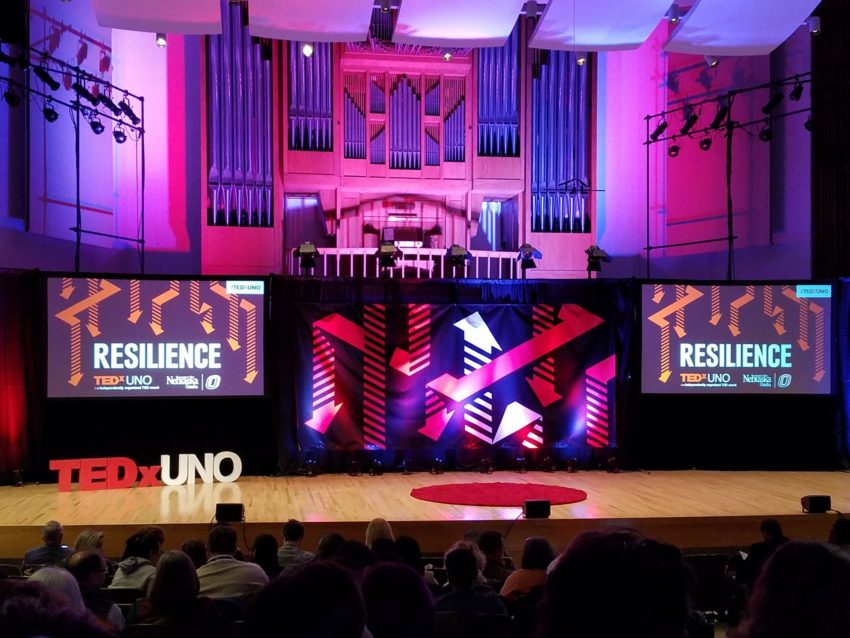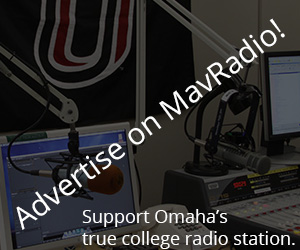
by Gabby Kesterson, General Manager
Omaha, Neb,–Hosted in the brand-new auditorium of the Strauss Performing Arts Center at the University of Nebraska at Omaha, the infamous TED Talks focused on Resilience and all the ways in which it can be defined. Speakers from all walks of life were asked to take the stage, show their vulnerabilities, and share their interpretations of the word ‘resilience’.
We learned that the general word ‘resilience’ means getting back up and pushing forward through adversity. Most people have experienced difficult times in their lives, or may have even had a near death experience, but what a person does with that experience makes all the difference. Through the presentations, it came to my attention that every single one of these speakers was different. Each varying in ethnicity, gender, identification, and class. Some were far into their dream careers and some were just getting started. While some told stories with humor, some told stories with harsh reality. However, each speaker was also alike. Although their experiences, struggles, and comebacks made them unique, they all were connected by their resilience.
To name a few speakers that really stood out to me in my first participation of TED, is to name a few people who described resilience in a way that made sense and resonated with me. The first to take the stage was Sasha Shillcutt, an anesthesiologist, who considers her life-changing moment the day she lost one of her patients on the operating table. She thought her career was over, couldn’t bear to return to work, and planned on resigning due to the immense shame she felt in failing. If it weren’t for a phone call from someone very important to her, telling her to get back on the horse and return to work, she would have resigned and given up on her career. Thankfully, she didn’t. Sasha stressed that life is all about failing forward, and that failing is a normal part of life that should be shared with others.
For another speaker, resilience came in the shape of overcoming her speech impediment. UNO student, Carrie Anderson, was labeled as having a disability as a child. She specifically struggled with pronouncing R’s, S’s and L’s – pointing out that all those letters are in the word resilience – and throughout her elementary, middle, and high school experience, was bullied because she “talked like a baby”. Though these were definite setbacks, she is currently resilient in pursuing her dream career of becoming a United States senator. She has grown and continues to grow from the labels that were placed on her, even though they still stick today. She stated that her biggest fear was not so much her presentation, but rather pronouncing her name and introducing herself in front of a crowd. She faced and conquered her fear before our very eyes.
The last two speakers whose presentations stuck with me were from Gabby Rivera and Dominique Morgan, who both shared a love for superheroes. Gabby shared her story on a video, but nonetheless moved us all. She had grown up and always been surrounded by strong, Puerto Rican women living in the Bronx. She considered them to be her superhuman inspirations, but her focus was not on the strengths these women showed. In contrast, it was their softness and vulnerability. She has since become a writer for Marvel’s first Latina LGBTQ superhero, America Chavez, also known as Miss America. She created America to be so strong she can punch holes into other dimensions, but she also created her to have flaws and shortcomings. These victories and struggles helped America’s journey to connect with herself and where she comes from, as well as guide Gabby’s own journey in life as a queer Latina woman.
As I also mentioned, the last speaker whose story I must share with you is Dominique Morgan. His shared passion of superheroes focused on his favorite comic-turned-to-film – Deadpool. Dominique identified with Deadpool in the fact that Deadpool went through severely traumatizing events, such as getting stabbed, losing friends and family, and nearly dying several times. Dominique also went through life-changing, traumatic events, with the focus of his presentation being his incarceration fresh out of high school. During his incarceration, he spent eighteen months in solitary confinement, was sexually assaulted by a correctional officer, suffered from depression, and missed out on major parts of life. Although this happened to him, he stressed that there are two main reactions from listeners to stories like this. Either people are happy for his success story and how strong he was, or people are crying and heartbroken at how hard and sad his life has been. He instead wants people to ask questionsand dive deep, such as asking how did he become so resilient? He has since become the National Director of Black and Pink, the largest prison abolitionist organization in the United States.
Dominique was my favorite speaker out of the thirteen immensely inspirational presentations. What resonated the most for me was that this entire TED event was not just to celebrate how strong the speakers are, what obstacles they had to overcome, or to simply empathize and “feel bad” for what these individuals went through. It was mainly about what these people did with the cards they were dealt. This event was truly inspirational to me as I learned so many impactful lessons from these presentations about resilience.
To see these videos, visit YouTube and search TEDxUNO. To learn more about the speakers, visit www.TEDxUNO.com. You can also follow TED on Facebook and Twitter to see when you can attend the next TED event.





